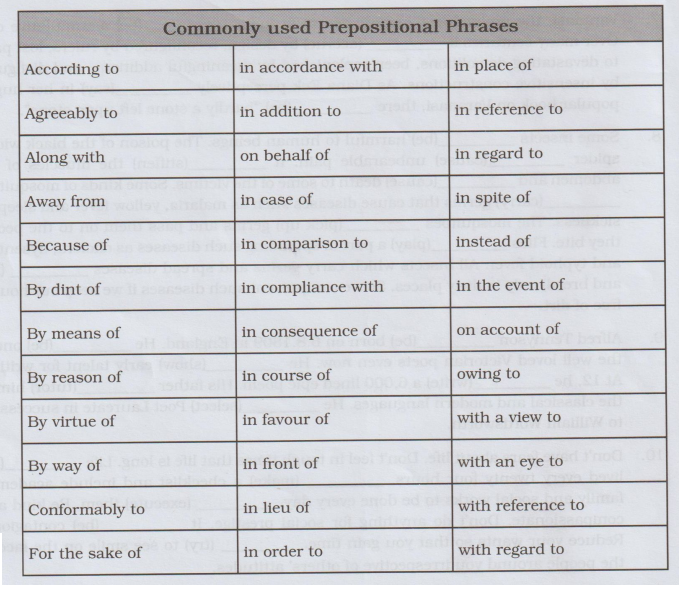Professional English: Grammar: UNIT 1
Prepositional Phrases
Grammar
A prepositional phrase is a group of words consisting of a preposition, its object, and any words that modify the object. Eg. Mother is going out with a cute baby.
CHAPTER -10
PREPOSITIONAL PHRASES
A
prepositional phrase is a group of words consisting of a preposition, its
object, and any words that modify the object.
Eg.
Mother is going out with a cute baby.
['with
a cute baby' becomes a prepositional phrase and it has a complement 'baby' and
a word (adjective) 'cute' which modifies the noun or complement, 'baby']
Most
of the time, a prepositional phrase modifies a verb or a noun.

There are three kinds of prepositional phrases:
Adverbial
prepositional phrases
Adjectival
prepositional phrases
I. Prepositional phrases behaving like nouns.
Prepositional
Phrases As Adverbsds
Here
are some more prepositional phrases functioning as adverbs:
Example
Lee
raised his small mackerel (marine fish) with utmost pride.
(adverb of manner)
Before
the war, Chris played football for
Barnstoneworth United. (adverb of time)
Manjunadhan
is tired from the hike. (adverb of reason)
Madhumathi
lives in that village. (adverb of place)
I
live near the stadium. (adverb of place)
She
speaks with notable enthusiasm. (adverb of manner)
II. Prepositional Phrases as Adjectives
Here
are some more prepositional phrases functioning as adjectives:
Example
Please
buy the scarf with dots. (dotted scarf)
The
man on the radio has a boring voice. (describes the man)
Give
me one of the brown ones. (may be a brown cake) (describes the
pronoun, 'one')
Do
you mean that boy in the corner? (corner boy)
I
know the policeman with the radio. (describes the policeman)
III. Prepositional Phrases with nouns:
Example
They
first met at a wedding. (preposition + noun phrase)
She
was taken ill during the trip. (preposition + noun phrase)
Would
you like to come with me please? (preposition + pronoun)
IV. Prepositions and their complements:
Prepositional
phrases consist of a preposition and the words which follow it. (a complement).
From
there, it'll take you about half an hour to
our house. (preposition + adverb)
Until
quite recently, no one knew about his paintings.
(preposition + adverb phrase)
She's
decided on doing a Spanish language course. (preposition +
_ing clause)
It's
a machine for making oil. (preposition + _ing clause)
If
you can wait until after my meeting with Sanadhanan, we
can talk then. (preposition + prepositional phrase)
We
were really surprised at what they spoke. (preposition +
wh_clause)
We
can put an adverb before a preposition to modify it. This applies mainly to
prepositions of time or place (above, before, far, deep, down, opposite):
They've
moved far into the country.
They
left the party just before us.
You
can't miss it. His office is almost opposite the coffee
shop.
V. How do you write a prepositional phrase?
At
the minimum, a prepositional phrase will begin with a preposition and end
with a noun, pronoun, gerund, or clause, the "object" of the
preposition. The object of the preposition will often have one or more
modifiers to describe it.
Example
The
witch sat on her broom.
("On"
is a preposition, "broom" is the object of the preposition, and
"her"
is the modifier.)
Easy
Examples of Prepositional Phrases
A
singer with passion
A
town near London
Keep
in time.
He
acts without thinking.
VI. The Function of Prepositional Phrases
Prepositional
phrases function as either adjectives modifying nouns or adverbs
modifying verbs.
Professional English: Grammar: UNIT 1 : Tag: : Grammar - Prepositional Phrases
Related Topics
Related Subjects
Professional English II
HS3251 2nd Semester 2021 Regulation | 2nd Semester Common to all Dept 2021 Regulation
